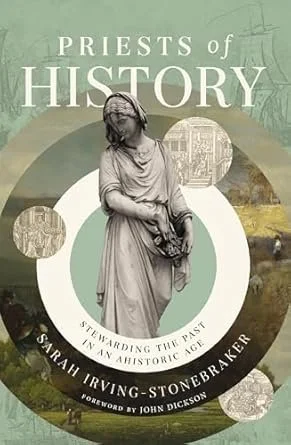Priests of History: Stewarding the Past in an Ahistoric Age
Irving-Stonebraker, Sarah. Priests of History: Stewarding the Past in an Ahistoric Age. Grand Rapids: Zondervan Reflective, 2024. Pp. xxvii + 256. $29.99.
Many Christian scholars and other thought leaders argue secularism has become the “default factory setting” across the modern West. Charles Taylor famously argues that our “social imaginary” has gradually shifted from one where atheism was virtually unimaginable to one where religion is increasingly unimaginable for a critical mass of people. Putting a more combative spin on this idea, Aaron Renn argues that Christians now inhabit a “negative world” that is hostile to religion. Though the New Atheism movement has for the most part run its course, it remains the case that more people identify as atheist, agnostic, or secular than was the case even a generation ago.
Historian Sarah Irving-Stonebraker identified with atheism until she became an adult convert to Christianity shortly after taking her first full-time faculty position. As a former atheist-turned-evangelical, Irving-Stonebraker argues that our secular age is also a deeply Ahistoric Age. Her much-discussed book Priests of History: Stewarding the Past in an Ahistoric Age offers a compelling defense of a Christian understanding of history and its implications.
Irving-Stonebraker argues there are five major characteristics of the Ahistoric Age (6):
1. We believe the past is merely a source of shame and oppression from which we must free ourselves.
2. We no longer think of ourselves as part of historical communities.
3. We are increasingly ignorant of history.
4. We do not believe history has a narrative or a purpose.
5. We are unable to reason well and disagree peaceably about the ethical complexities of the past—that is, the coexistence of good and evil in the same historical figure of episode.
She challenges these ahistorical tendencies over twelve chapters, plus an introduction and conclusion. The book is divided into three parts, moving from (ironically) the historical context of our Ahistoric Age, to the value of history, especially for Christians, to the various ways history contributes to our spiritual maturity. The narrative is at various points autobiographical, scholarly, apologetic, and devotional. While the book cannot be neatly categorized into a particular genre, the throughline of the book is that Christians who inhabit our Ahistoric Age are called to be priests of history. Irving-Stonebraker argues,
We must understand how we can engage in the practice of history. In this book, I am arguing from a biblical position that all Christians are called upon to tend and keep history—to be priests of history. This does not necessarily mean I expect all of us to roll up our sleeves and dig into the archives or write professional or scholarly history. But it does mean all Christians can engage with history in our daily lives and pass down our heritage, especially through our intellectual and spiritual formation and discipleship (61).
Irving-Stonebraker entered the academy as a historian of science. Her research led her to the seventeenth-century natural philosopher Robert Boyle, who was no proto-secularist but rather a devout Christian who believed God had called him to be a “priest of nature.” Now, writing as a Christian historian, she draws on Boyle’s language, the “royal priesthood” imagery of 1 Peter 2:9, and the reformational doctrine of the priesthood of all believers to make her case. She writes,
On the one hand, this vocation involves the work of tending the past, that is, uncovering the historical stories of people sometimes overlooked, bringing historical injustices to light, and recognising the sins of the past, including our own. On the other hand, our calling to be priests of history is conservative in its role of keeping and watching over the past. This involves protecting and passing don historical knowledge and our heritage as Christians; our stewardship covers not only the doctrines of orthodox biblical teachings, but also includes spiritual habits, practices, and traditions. The work honours the past and values our inheritance (96).
Readers will likely resonate with the varied emphases of the book. Those who are interested in apologetics and culture will appreciate how Irving-Stonebraker applies late-modern secularism to our increased tendency to devalue history. Christian historians will find the middle chapters helpful, since they represent her approach to the discipline of history. Readers concerned with spiritual formation and intellectual discipleship will be drawn to the latter chapters. Though Irving-Stonebraker makes no bones about the fact that she writes as a convinced Anglican, one does not have to share her ecclesial tradition to appreciate her wider arguments about the formative value of Christian history.
Priests of History deserves a wide readership from not only Christian historians but also those in other disciplines in the Christian academy and even ministers in local churches. While it is likely not the best book to assign to undergraduates in introductory history courses, it would make an excellent assigned reading for either an undergraduate capstone course in history or a historiography course for graduate students in history or church history. The book would also work in certain courses related to the intersection of faith and culture, apologetics, or spiritual formation. For my part, I intend to recommend the book in my church history courses and cite Irving-Stonebraker liberally as I make my own case for why history matters for the Christian.
NATHAN A. FINN
Kalos Chair for Intellectual Discipleship | Executive Director of the Institute for Faith and Culture
North Greenville University

